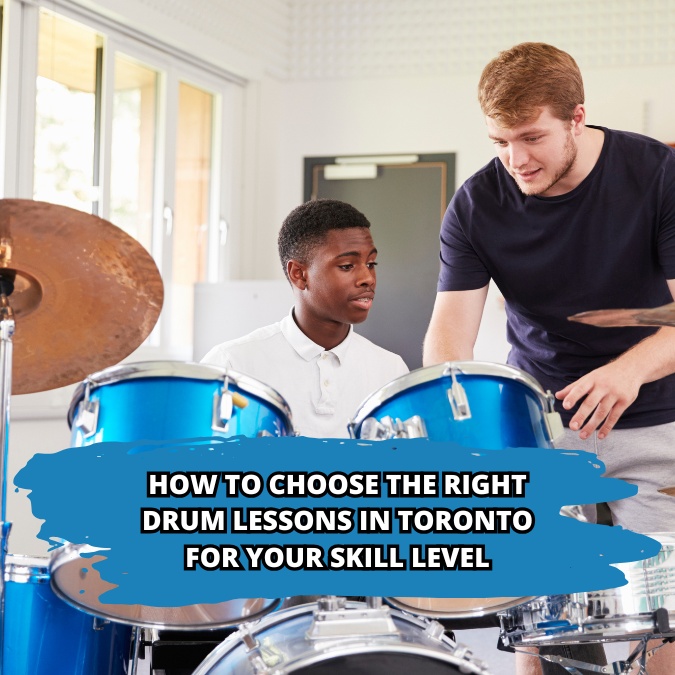How to Choose the Right Drum Lessons in Toronto for Your Skill Level

Why Choosing the Right Drum Lessons Matters
Selecting the right drum lessons in Toronto is crucial for achieving your musical goals effectively. The wrong choice can result in slow progress or frustration, leading to a loss of interest. Tailored lessons that match your skill level and learning style allow you to build confidence and master techniques progressively. Investing time in finding the right lessons ensures you enjoy your drumming journey while achieving measurable results.
Avoiding Common Mistakes When Selecting Lessons
Common mistakes include choosing lessons based solely on price or proximity without considering the instructor’s qualifications. Some students also overlook the importance of a curriculum that suits their goals, such as learning specific drumming styles. Ignoring compatibility with the teacher’s teaching approach can hinder your learning experience. Avoiding these pitfalls ensures you choose lessons that truly support your growth as a drummer.
How Tailored Instruction Impacts Your Progress
Tailored instruction allows drummers to focus on their unique strengths and weaknesses. A personalized approach helps students develop the right techniques, such as proper hand positioning and rhythm coordination. It also ensures that the pace of learning aligns with the student’s capabilities, preventing feelings of being overwhelmed or underchallenged. This individualized attention accelerates progress and boosts confidence.
Assessing Your Current Skill Level
Understanding your skill level is key to finding the most effective drum lessons in Toronto. Beginners often need lessons that focus on the fundamentals, such as holding drumsticks and learning basic rhythms. Intermediate drummers benefit from lessons that refine existing skills and introduce advanced techniques. Advanced players require lessons focused on mastering complex rhythms, improvisation, and performance readiness.
Identifying Beginner, Intermediate, and Advanced Stages
Beginner drummers typically lack experience with drumming basics, while intermediates are comfortable with foundational techniques and can play simple songs. Advanced drummers can perform complex pieces and experiment with improvisation. Knowing which stage you’re at ensures that you choose lessons aligned with your ability and goals, making your learning process smoother and more rewarding.
Self-Assessment Tips for Drummers
Self-assessment involves identifying your strengths and areas for improvement, such as rhythm consistency or hand coordination. Record yourself playing and evaluate your technique, noting any mistakes or patterns. You can also seek feedback from experienced drummers or instructors to gauge your current skill level. Accurate self-assessment helps you choose the right drum lessons that cater to your needs.
Types of Drum Lessons Available in Toronto
Toronto offers a range of options for drum lessons, making it easy to find one that suits your preferences and lifestyle. Whether you prefer private lessons, group settings, or the flexibility of online learning, there’s something for everyone. Each type has unique advantages, and understanding these can help you make an informed decision about your learning path.
Private Drum Lessons: Personalized Learning
Private drum lessons provide one-on-one attention, allowing the instructor to tailor lessons to your specific needs and goals. This format is ideal for beginners who need extra guidance and advanced drummers focusing on niche techniques. Private lessons also allow for flexible scheduling, making them suitable for students with busy lifestyles. They are an excellent choice for maximizing progress in a short amount of time.
Group Drum Classes: Collaborative Growth
Group drum classes offer a dynamic learning environment where students can collaborate and learn from each other. These classes are often more affordable and provide opportunities to practice ensemble playing. Group settings also help build confidence as students play alongside others. They are a great way to develop rhythm synchronization and teamwork skills while enjoying a social experience.
Online Drum Lessons: Flexibility and Convenience
Online drum lessons have become increasingly popular due to their convenience and accessibility. Students can learn from skilled instructors without the need to commute, making them an excellent option for busy individuals. Many online platforms offer customizable lesson plans and interactive tools to track progress. This flexibility makes online lessons a viable alternative for drummers in Toronto who need adaptable schedules.
Factors to Consider When Selecting Drum Lessons
Selecting drum lessons in Toronto requires careful consideration of multiple factors. The qualifications of the instructor, the location of lessons, and the overall cost are key aspects to evaluate. Ensuring that the lessons align with your goals and preferences can make a significant difference in your learning experience.
The Importance of a Qualified Instructor
A qualified drum instructor can provide structured lessons that build foundational skills effectively. Look for instructors with formal training or significant professional experience in drumming. An experienced teacher can identify and correct mistakes early, preventing bad habits. Verifying credentials ensures you’re learning from someone capable of guiding you toward mastery.
Scheduling and Location Convenience in Toronto
Choosing a lesson location that fits your routine minimizes unnecessary travel time and ensures consistent attendance. Many drum schools in Toronto offer flexible scheduling to accommodate students’ busy lives. Whether you prefer in-person or online sessions, ensure that the timing and location are practical for long-term commitment. Convenience plays a major role in maintaining motivation and consistency.
Cost and Affordability of Drum Lessons
The cost of drum lessons in Toronto varies widely based on factors such as the instructor’s experience and lesson format. Private lessons are typically more expensive than group or online sessions. While affordability is important, it’s also crucial to consider the value provided by the lessons. Balancing cost with quality ensures you get the best return on your investment.
Recommendations for Drum Lessons in Toronto
There are numerous options for drum lessons in Toronto, catering to diverse needs and skill levels. Researching the best options can help you find lessons that align with your goals. Consider reputable drum schools, independent instructors, and online platforms to explore all available opportunities.
Top Drum Schools for Beginners
Drum schools like Elite Music Academy in Toronto are excellent starting points for beginners. These schools offer structured curricula and experienced instructors who specialize in teaching fundamental techniques. Beginner-friendly programs often include exercises to develop rhythm, coordination, and hand techniques. Starting with a professional setup ensures a strong foundation for future growth.
Best Options for Intermediate and Advanced Drummers
Intermediate and advanced drummers can benefit from lessons that focus on refining techniques and exploring specialized styles. Instructors who have experience in performance and advanced drumming concepts can provide valuable insights. Advanced lessons often include topics like improvisation, drum soloing, and playing in a band setting. These lessons help drummers reach their full potential.
Specialty Drum Classes for Unique Styles
For those interested in niche drumming styles, Elite Music Academy offers specialty classes in genres like jazz, Latin, and world percussion. These lessons allow drummers to explore different cultural rhythms and expand their repertoire. Specialty classes are a great way to diversify skills and develop a deeper appreciation for drumming traditions. They are ideal for drummers looking to stand out.
Tips for Maximizing Your Drum Lessons
Maximizing your drum lessons involves consistent practice and setting clear goals. Creating a routine that prioritizes practice helps reinforce skills learned during lessons. Staying motivated and focused ensures steady progress.
Practicing Effectively Between Classes
Effective practice involves focusing on specific skills or exercises covered in your lessons. Break your practice sessions into manageable segments, such as working on rhythm patterns, hand techniques, or playing along to songs. Using a metronome helps maintain consistent timing and improves overall precision. Regular practice strengthens your drumming foundation and accelerates improvement.
Setting Achievable Goals for Your Drumming Journey
Setting goals helps you measure progress and stay motivated throughout your drumming journey. Start with small, realistic objectives, such as mastering a simple rhythm or completing a practice exercise. Gradually work toward larger goals, like performing in front of an audience or learning a challenging song. Clear goals provide direction and a sense of accomplishment.
Start Your Drumming Journey in Toronto
Finding the right drum lessons in Toronto ensures you achieve your musical goals while enjoying the learning process. Toronto’s diverse range of lesson options makes it easy to find the perfect fit for your needs. Whether you’re a beginner or an experienced drummer, investing in tailored lessons ensures continuous growth and enjoyment. Start your journey today and unlock your full potential as a drummer.
FAQ
What is the average cost of drum lessons in Toronto?
The average cost of drum lessons in Toronto ranges from $30 to $60 per hour. Group classes and online lessons tend to be more affordable, while private lessons with experienced instructors may cost more.
Are there drum lessons in Toronto specifically for beginners?
Yes, many schools and instructors in Toronto offer beginner-focused drum lessons. These lessons cover fundamental techniques such as stick grip, basic rhythms, and coordination exercises.
Can I take online drum lessons if I live in Toronto?
Absolutely, online drum lessons are a convenient option for Toronto residents. Many instructors and platforms offer virtual lessons tailored to various skill levels, providing flexibility and accessibility.
How often should I practice between drum lessons?
Practicing at least 3-4 times a week for 30-60 minutes per session is recommended. Consistent practice helps reinforce what you’ve learned and improves your drumming skills over time.
What equipment do I need for drum lessons in Toronto?
For in-person lessons, most drum schools provide the necessary equipment like drum kits and sticks. However, it’s a good idea to have your own drumsticks and a practice pad for at-home practice. If you’re taking online lessons, you may need a drum kit, headphones, and possibly a microphone or webcam for clear communication with your instructor.


